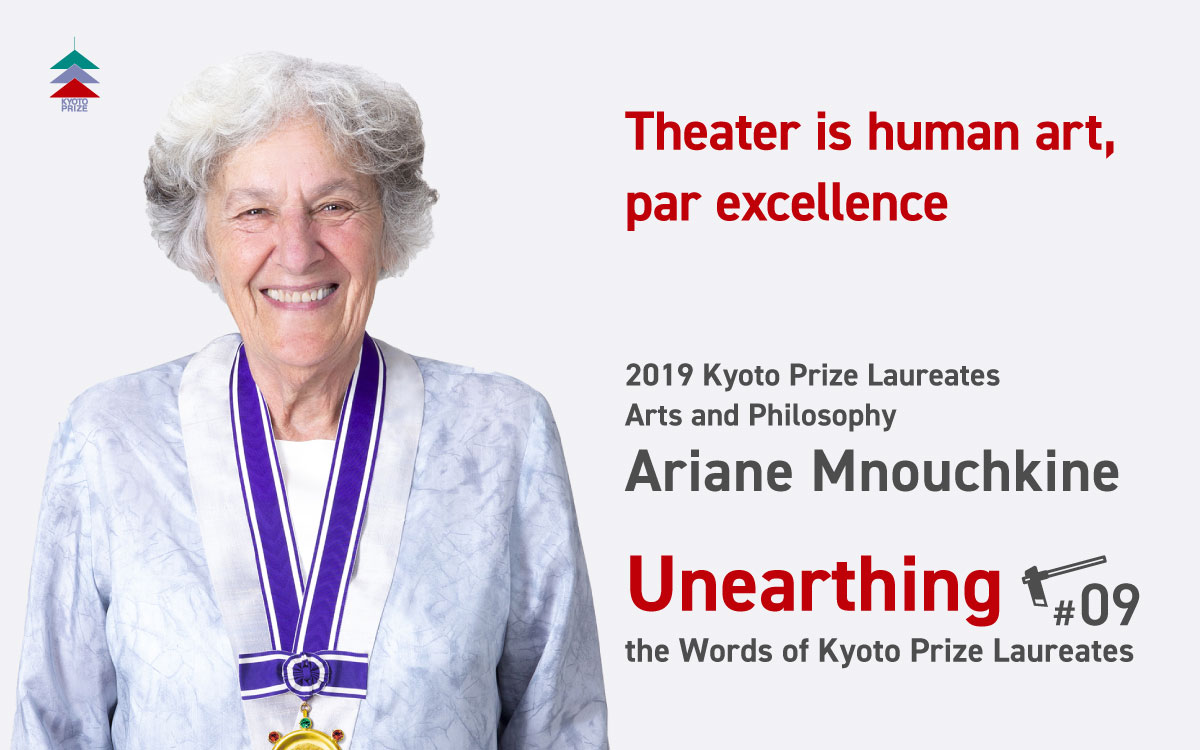
An international award of Japanese origin, the Kyoto Prize is presented to individuals who have made significant contributions in the fields of science and technology, as well as arts and philosophy. Kyoto Prize laureates are those who have made an extra effort to plumb the depths of their chosen fields and profoundly inspired the scientific, cultural, and spiritual betterment of humankind through their achievements. In this series of “Unearthing the Words of Kyoto Prize Laureates,” we will interview the past laureates of the Kyoto Prize and take a closer look at the words that they delivered at their Commemorative Lectures to get to the heart of their unique ideas, thought process, and attitudes as inquirers. In this installment of the series, we had the pleasure of interviewing Mrs. Ariane Mnouchkine, the 2019 Kyoto Prize laureate in the Arts and Philosophy category.
Ariane Mnouchkine
Director of Théâtre du Soleil. Ariane Mnouchkine founded the Théâtre du Soleil in 1964 with her fellow members of the Association théâtrale des Étudiants de Paris. The company moved to the Cartoucherie in the Bois de Vincennes in 1970. The Théâtre du Soleil’s adventure has been shaped over the last 60 years by the loyalty and affection of a large audience both in France and abroad. Its journey has been marked by a constant questioning of the role and place of theater and its ability to represent the present day. This commitment to tackling major political and human issues from a universal angle is combined with a search for great forms of storytelling, at the confluence of the arts of East and West. Ariane Mnouchkine has received numerous awards, including the Europe Theatre Prize in 1987, the Golden Lion for Lifetime Achievement at the Venice Biennale in 2007, and the International Ibsen Award in 2009. Read more
Previous articles in “Unearthing the Words of Kyoto Prize Laureates”
Nishimura : We saw LʼÎLE DʼOR Kanemu-Jima at the Rohm Theatre Kyoto and this play really moved us. I’d like to start by asking you a question about what we felt during the performance: the link between theater and society. Alongside the approach of dealing with political and social issues in the play, we felt that the collective creation, based on the actors’ own feelings and movements, allowed the link between theater and society to develop naturally. What sense does it make not to separate theater and society, but rather to strongly link them?
Mnouchkine : First of all, let’s be very clear, the answers I’m going to give you are my personal opinions, and I don’t believe that all directors think the same. So I’m going to tell you what I believe, what I think.
That’s a very big question you’re asking me, and it’s very difficult to answer. Why is it a huge question? Because theater has always been linked to society. To my mind, theater is all about human beings and their relationship with gods, kings, suffering, society and politics. While there are theaters that are a reflection of society, there are also theaters that claim or hope to have some impact on society and to be involved in political action. But all theater is about society. And human beings are social animals who create societies that are more or less good.
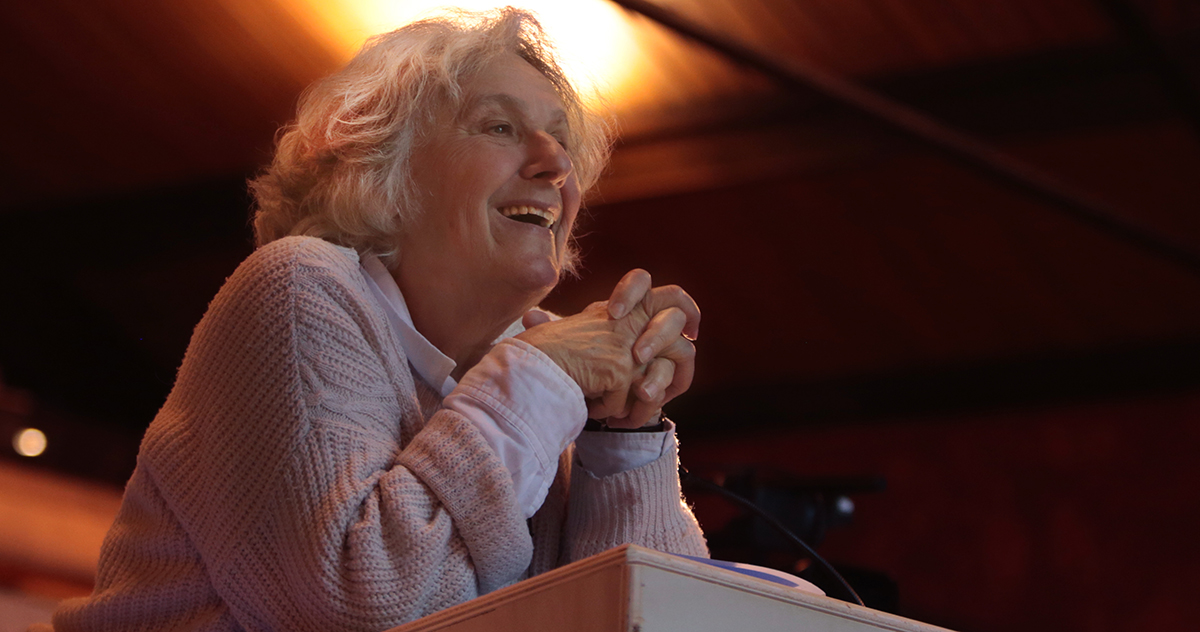
Of course, actors are also social beings, human beings living in society. When we work collectively as we do at the Théâtre du Soleil, actors, perhaps more than any other members of society, have to be permeable to that society, while at the same time experiencing it, putting up with it and sometimes fighting against it. Actors must reveal, as if cracking a walnut, what is obscure or hidden in society. Because the disasters that are happening now are sometimes the result of something that was decided 100 years ago. And this has to be revealed through emotion, beauty and poetry.
At the moment, in a world as cruel and explosive as ours, we cannot be completely overwhelmed by the conflicts in our societies, but our role is to give them a form, to bring them to light.
Nishimura : Brexit was one of the topics you touched on during the Kyoto Prize Commemorative Lecture, and you said something like, “Please, I hope you will allow me what might seem to you like a pointless digression, to Japan, and specifically of today–an inevitable digression for a woman of the theater whose source is none other than this world around us.” How do you go about extracting these things hidden in society, as if encased in the hard shell of a walnut?
Mnouchkine : For example, yesterday we had a company meeting about the next show, and the whole meeting was about saying: “We need to acquire a huge amount of historical knowledge. How do we go about it?” Some actors never went to university, and some aren’t great readers. How do you get them to read fairly dry works? Look for recordings, get hold of audio books? All this preparation for the actors and actresses before they perform is a lot of work. That’s the first thing.
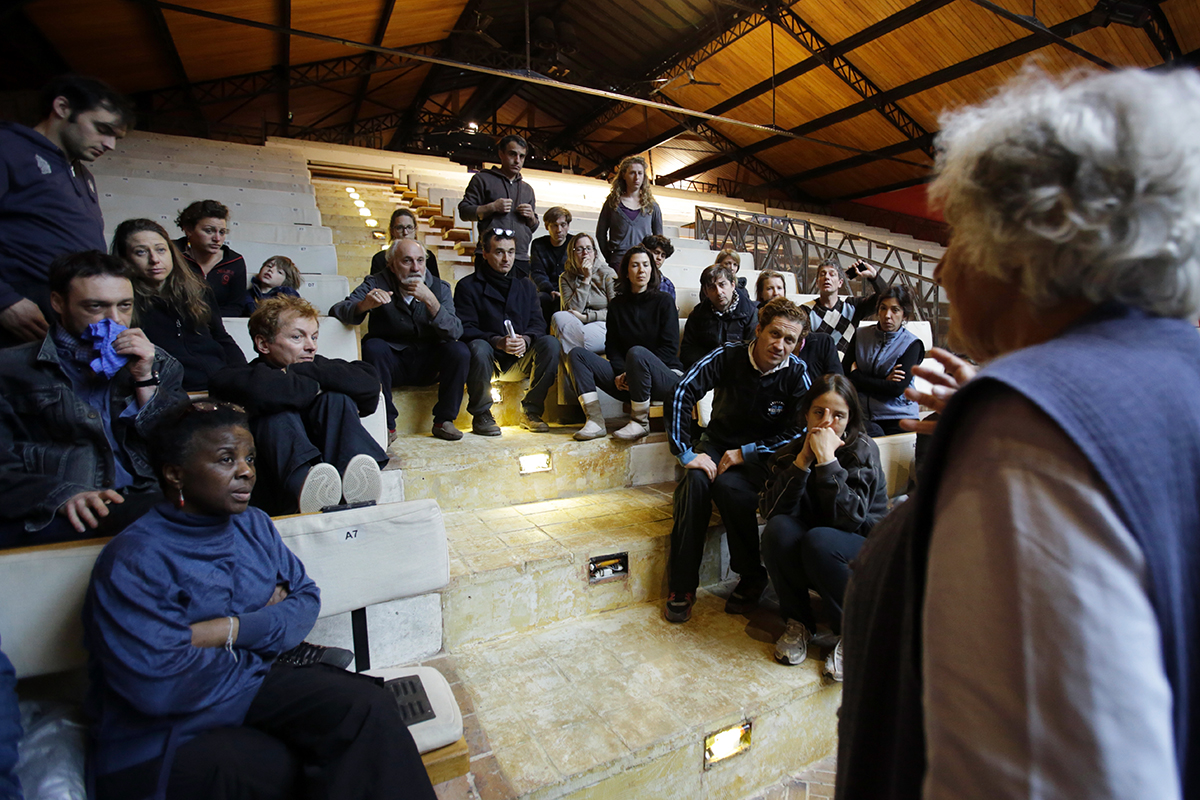
Another thing is to acquire enough humility not to let ourselves be burdened with ignorant opinions. Basically, opinion is a curse, because having an opinion, in a way, excuses ignorance. When you have an opinion, you think you’re on the right side and you don’t learn how things happened. Who started it? When did it start? Why did it happen the way it did? What ideologies were at work at the time? How can we shed light on them or get rid of them? My practical answer to that is work and patience.
Once you have acquired a certain amount of knowledge, you are faced with the difficulty of putting it into shape. At that point, the question of art arises. This is the slight or radical transformation that we have to make to an event so that it becomes theatrical and so that it is doubly felt, in its meaning and in its form, in the light that we want to give it, the metaphor that we believe in our soul and conscience to be the most accurate, the closest to what can be called the truth. In this way, we need to transform the knowledge we have acquired.
Nishimura : When I saw LʼÎLE DʼOR, I got the impression that you weren’t trying to pass on knowledge exhaustively, but rather to pass it on through theater. I also felt that theater had the power to encourage people to think.
Mnouchkine : That’s the art of theater. The art of theater is to find harmony even in the midst of the worst conflicts. Emotion has to be right in the middle of the din of a battle or a murder. A pistol shot is not enough to convey a murder on stage. We still need to know who is doing the killing, why, and why now? Where is the cruelty, where is the deliverance, where is the glory? It is the art of theater that will make us feel it.
Sugimoto : Before seeing LʼÎLE DʼOR, we attended a theater workshop given by Duccio Bellugi Vannuccini. During the workshop, Duccio stressed the importance of ‘receiving.’ He repeated: “The important thing is to receive well and not to think about what you have to say when you listen to the other person.” Another phrase that stuck with me was: “Imagination is a muscle.” I remembered this phrase as I listened to you earlier. Does that mean that the “work” you were talking about consists of receiving, i.e. assimilating knowledge, and that the actor or actress then uses the muscle of imagination to express that knowledge?
Mnouchkine : Yes, exactly. Before going on stage, actors can and should work with their heads, but not on stage. An actor’s talent lies in his or her imagination. Yesterday I read a quote that rang so true: “To believe, you have to imagine.” I’d never even thought of that phrase, and I’m very jealous of its author! It goes perfectly with what some people say: “There can be no compassion without imagination.” I’m talking about compassion almost in the Buddhist sense, that is to say, understanding the suffering of others. Imagination is an essential, primordial muscle if we are to live in a society, create and perform, and receive others, as is the case in the theater.
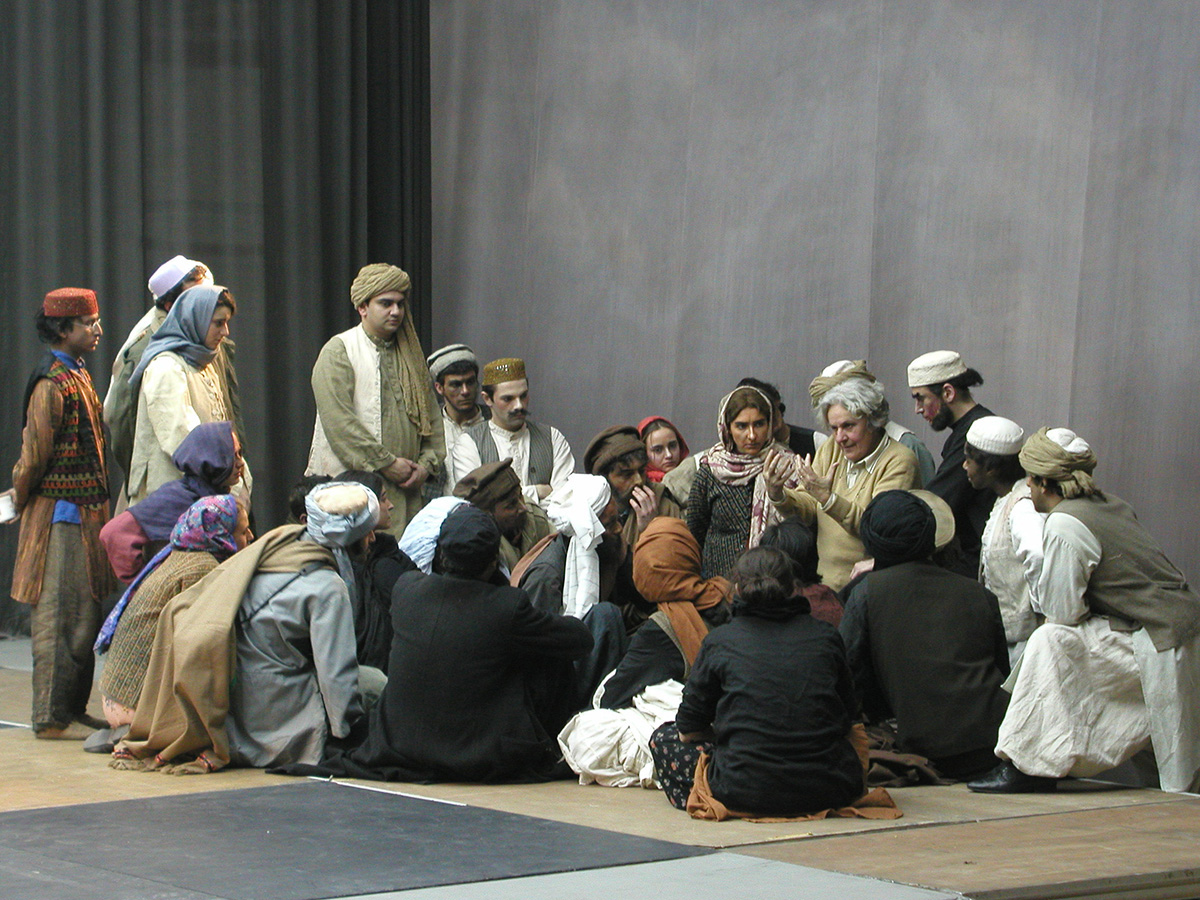
And imagination comes in handy. I’m currently in my car at Porte dʼIvry, going on holiday to the seaside for a few days. There I saw a little lady who struck me as lonely, even though she may have eight grandchildren waiting for her at home. But the way she was walking, with her shopping bag, her shoes and her sad expression, I began to imagine the loneliness of this woman. When it comes down to it, imagination is not necessarily an exact thing. It’s a muscle you have to exercise.
Nishimura : My speciality is psychology and anthropology, so I’m always thinking about how the human imagination shapes the world. For the world to change, most people focus on things that are easy to see and use repeatedly, like technology and action. But to make the world move, we need imagination. How can we remember the power of imagination?
Mnouchkine : There is no contradiction between imagination and reality. One of the little phrases we often say to each other at the Théâtre du Soleil is this aphorism by Jiří Trnka, the Czech animation filmmaker: “The condition of the marvellous is concrete reality.” Imagination is not abstract. Imagination is lived through very real feelings and actions.
Nishimura : A simpler question: how can we get more people to come to the theater?
Mnouchkine : I think this is a question that the whole theater world is asking itself. Vsevolod Meyerhold (Russian playwright and director – 1875-1940) said: “You have to enter a theater as if it were a palace of wonders.” This is the basis for attracting audiences. However, theaters are often not palaces of wonders. They resemble banks, large austere institutions riddled with prohibitions and constraints. They are often authoritarian and imperialist architectural spaces, which do not allow the creators who use them to live in them freely, to decorate them, to change the venues according to the times or the season of the shows. So they are often palaces of power, rather than palaces of wonder.
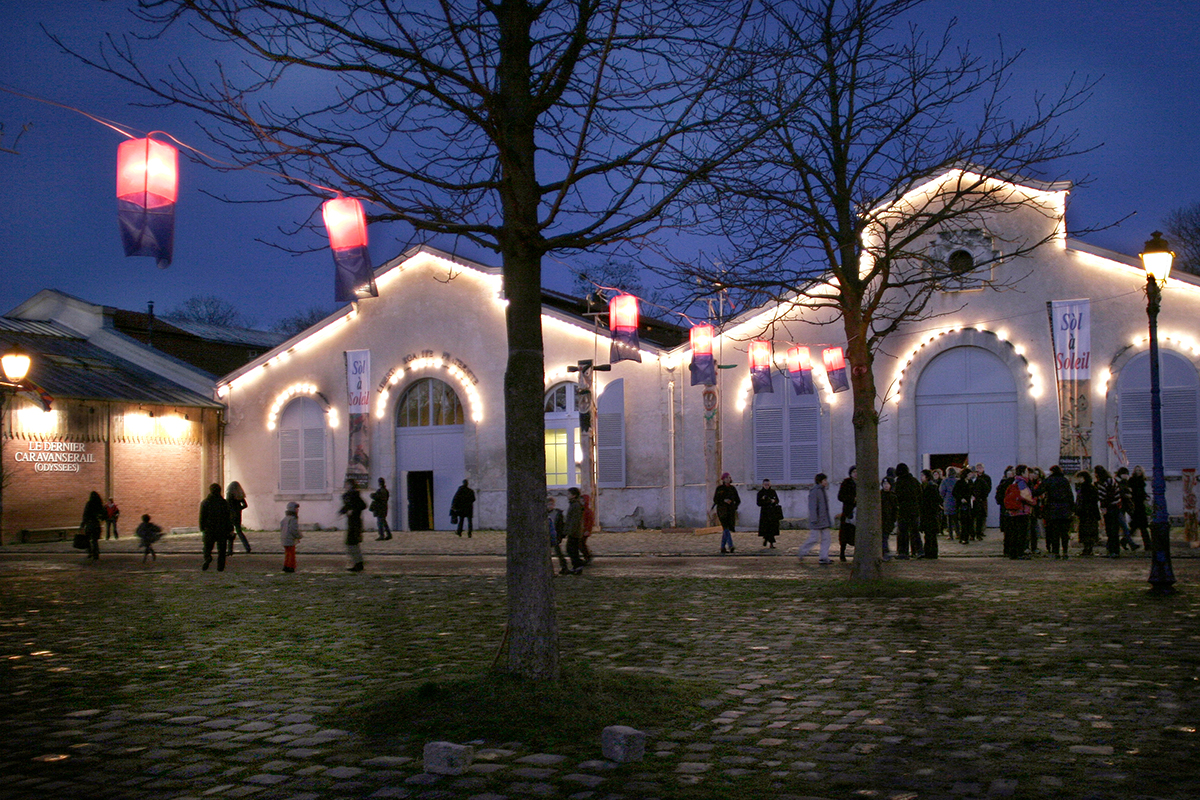
After that, it’s a lot of work, once again, to create a palace of wonders, to bring it to life day after day, to always amaze the audience. When audiences arrive, whether they’re from Paris or Tokyo, they’ve just come out of a hellish machine, they’re exhausted. You have to amaze them with the show, of course, but you also have to receive them with love and respect. They need to feel reassured: “Here, you risk nothing. Here you are in your own palace of wonders.” That’s how we prepare them for the show.
Sugimoto : On the subject of the love and respect shown to the audience, I was thinking about the fact that you used to tear the tickets yourself at the door. I’d like to know why you still do that?
Mnouchkine : I’m still doing it, because I love it. I love seeing people arrive. They always say something nice to me and I love to feel their eagerness and their anticipation. I find it so miraculous to open the door and see all these spectators there. So I don’t want to miss out on this. But standing in the cold for an hour and a half is pretty tiring. So I don’t do it every day any more, but about three days a week, including weekends.
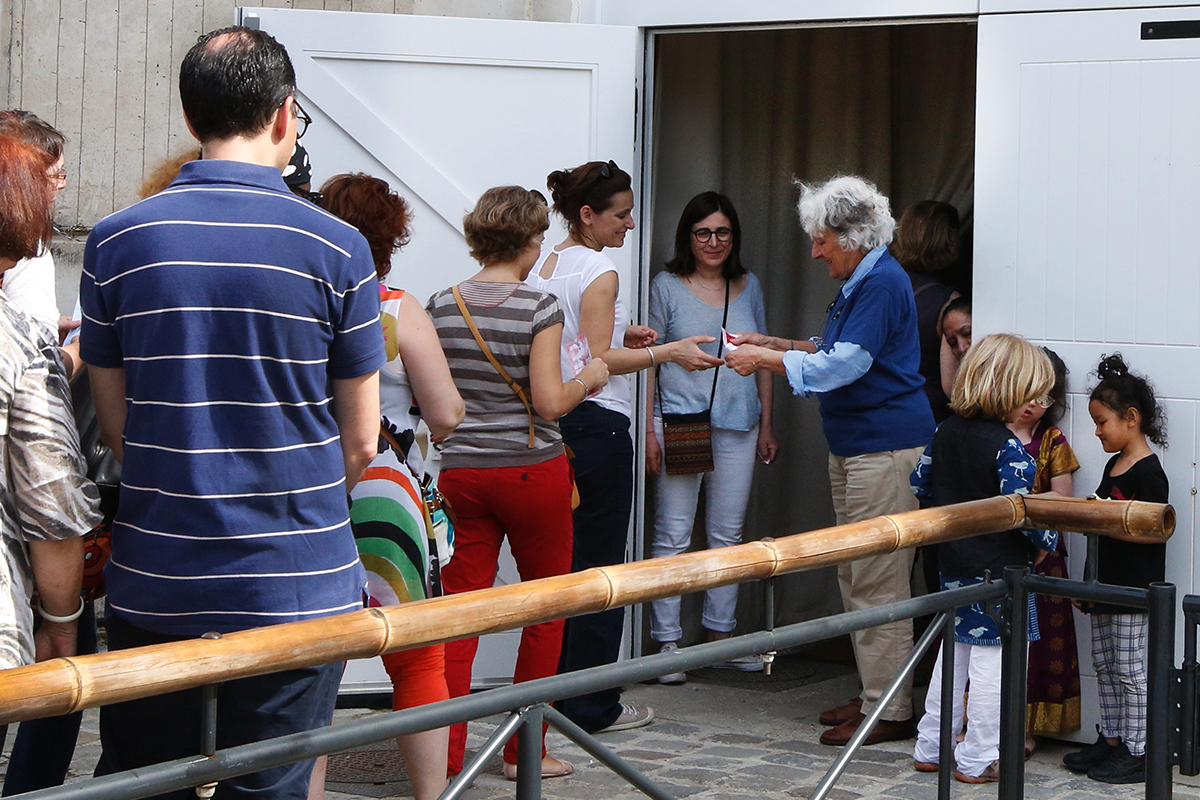
Nishimura : When I saw LʼÎLE DʼOR, I was impressed to see the kurokos, stage assistants dressed in black, appear on stage to music and carry out the set changes cheerfully. I found it very human to see actors enjoying their role as kurokos. If we are surprised or delighted by such human moments, perhaps it’s because we rarely encounter them in ordinary life. Compared to the Théâtre du Soleil, our society doesn’t seem human. Some people even fear that if we were more human, society would collapse. Personally, I think we could work towards a better society and discover new kinds of relationships by being more human.
Mnouchkine : It’s true that our society is becoming dehumanised, in Japan, in Europe and in France. But regaining our humanity is not impossible. Restoring a humane society is a utopia, a goal, a project, an objective. Above all, we must not give up on our humanity.
It’s a huge compliment when people say to us: “I felt humanity when I saw your show.” That’s surely what audiences are looking for. Theater is human art, par excellence; it’s human beings on a stage facing other human beings. It’s not film, it’s not virtual reality, it’s not the Internet. I always say that this is why theater is immortal and why it cannot be taken away from us.
We need to show the public that the brutality they may experience on the outside doesn’t have to be so, that we can exchange ideas and be respectful towards each other, by liking each other a little. That makes things easier and more productive in a way. And so that’s also part of the promise that our palace of wonders must keep. I think theaters should always be examples of humanity. I always say to my grandson: “You know, directing isn’t about giving orders, it’s about setting an example.” I think that if we want to change society, we must first change ourselves. Letting the audience imagine how it could be different means, in practical terms, that when you enter a theater, everything has to be different, in terms of relationships, behavior and the beauty shared.
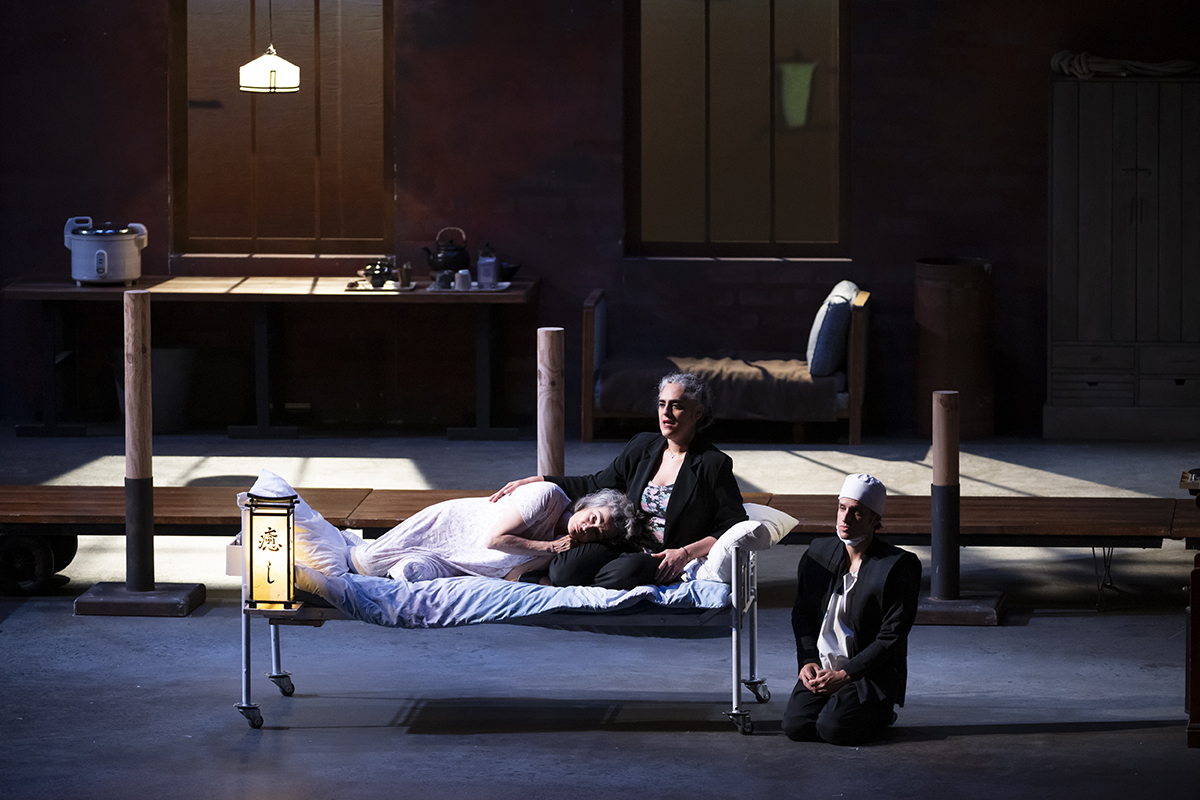
Nishimura : Since the 1960s, the search for utopia has declined to the point of almost disappearing. Theater perhaps offers a model of the kind of life and society to which we should aspire, and that’s why I think it’s important to go to the theater.
Mnouchkine : Utopias in motion declined after the 60s, because some utopias were very badly realised. Some utopias became hells. I’m thinking in particular of the enormous disillusionment caused by the Soviet Union’s implementation of communism, which obviously had a terrible impact on the whole idea of utopia.
Today, some people even think that a utopia that has been achieved can only be fascist or totalitarian. I don’t think that just because a utopia has turned into hell on earth that we should think that all utopias necessarily turn into hell. Here again, we need to be more subtle and understand why communism, from its very beginnings and from the very first days of its implementation in Russia, was immediately transformed into hell. This is terrible: hell began in 1917, just after the February Revolution, which promised happiness. This is a terrible example of a utopia on the way to becoming a reality that turned into hell. And it has been repeated in China, Cambodia and North Korea. All these monstrous ideologies have devalued utopia. Yet man needs a utopia to achieve, he will always seek happiness. But happiness is achieved with others, not without them.
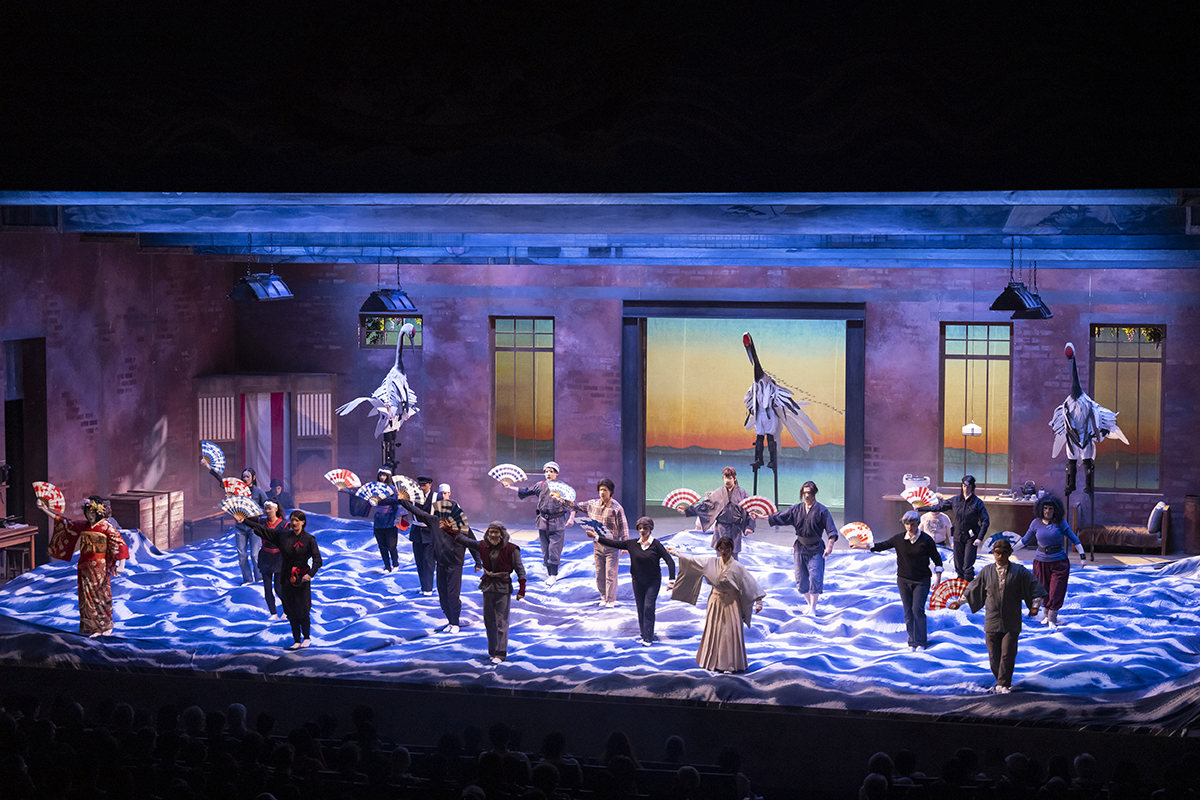
Sugimoto : The Théâtre du Soleil has occupied*1 the Cartoucherie, a building erected in the 19th century by Napoleon III, since 1970. The troupe has transformed the building as it saw fit to make it the setting for its collective creative activities. It’s also where they give their performances. In a way, it’s the realisation of a theatrical utopia. It’s the manifestation of what you said earlier: imagination is reality. However, after 60 years of creation, I imagine that you plan to pass this place on to the next generation. How do you intend to pass on the Théâtre du Soleil to the next generation?
Mnouchkine : Charles-Henri Bradier has been co-director for 15 years now. So the handover is underway. The hardest thing to pass on will be the shows, the direction and everything else. I’m almost 85. I’m not retiring, but I’m taking a step back, and this step back is becoming more pronounced. The only place where I’m not retreating is in directing. At the moment we’re presenting a show, Notre vie dans l’art, with 11 actors from the company, written and directed by Richard Nelson, a wonderful American writer and director. In the meantime, I’ve been able to start preparing the next show, due to open at the end of next year… In any case, the Théâtre du Soleil will be passed on. And if audiences still want to come to the Cartoucherie, we’ll be ready and delighted to welcome them.
*1. In 1970, the Théâtre du Soleil premiered “1789 ” at the Piccolo Teatro in Milan, where Giorgio Strehler welcomed and confidently supported the young troupe, which then moved to the Cartoucherie, an abandoned and isolated former military site in the Bois de Vincennes, on the outskirts of Paris. From the outset, the Théâtre du Soleil saw the Cartoucherie as a place that would enable it to move away from the theater as an architectural institution, opting for a shelter rather than a theatrical structure, at a time when urban transformations in France were profoundly changing the place of people in cities and the position of the theater in the city. In the Cartoucherie, the Théâtre du Soleil found a practical tool for creating the elitist yet popular theater that Jean Vilar and Antoine Vitez had dreamed of. In the years leading up to 1968, the aim was to establish a new relationship with the public and to set itself apart from bourgeois theater by creating high-quality popular theater. By the 1970s, the troupe had become one of France’s leading companies, both in terms of the number of artists it welcomed (more than 70 people a year) and its national and international reputation. Ariane Mnouchkine’s commitment to the notion of a ‘theater company’ led her to base the group’s ethos on a few basic rules: everyone, regardless of their profession, receives the same salary, and the whole company is involved in the day-to-day running of the theater and in welcoming the public to performances.
Click below to watch the YouTube video of Commemorative Lecture from 2019.
Previous articles (English)
#1 Toyoki Kunitake: You’re Sure to Find a Breakthrough in the Process of Going Back and Forth Between “Abstraction” and “Materialization”
#2 Takashi Mimura: “Being of Service” Means to Be Needed and Appreciated by the Overwhelming Majority
#3 Takeo Kanade: The Habit of Returning to the Question “Why am I Doing This Research?” Is the Key to Reaching the Essence
#4 Tamasaburo Bando V: It is Only in Our Encounters with Others that We Can Convey the Ineffable
#5 Graham Farquhar: As Part of An Ecosystem, I Exist as an “Old Tree in a Forest”
#6 Edward Witten: Science Helps Us Understand the World Better
#7 Peter Raymond Grant, Barbara Rosemary Grant: Substantial Value in Connections Found Between Disparate Ideas and Facts
#8 Joan Jonas: Artists Translate the World and Communicate in Their Own Language with the Audience
[About the interviewer]
Yuya Nishimura
Executive Director, MIRATUKU. Earned a Master’s Degree from the Osaka University Graduate School of Human Science. Built a cross-sector -business and -domain innovation platform, supports leading companies (about 30 annually) in creating new businesses, assists launch of R&D projects, designs future visions, and searches for future trends. Other positions include Innovation Designer, Innovation Design Office, RIKEN, Japan, and Specially Appointed Associate Professor, Social Solution Initiative (SSI), Osaka University MIRATUKU website
[About the writer]
Kyoko Sugimoto
Freelance writer. Earned a Master’s Degree in Media, Journalism & Communication, Graduate School of Letters, Doshisha University. Interviews researchers, business managers, Buddhist monks, urban designers on such topics as asylums, communities, and Buddhism. Authored Kyodaiteki Bunka Jiten: Jiyu to Kaosu no Seitaikei (Kyoto University Cultural Encyclopedia: Ecosystem of Freedom and Chaos), Film Art, Inc. writin’room